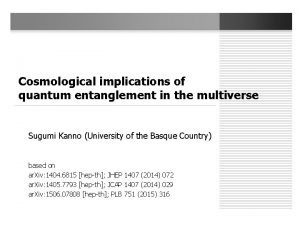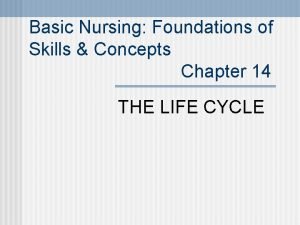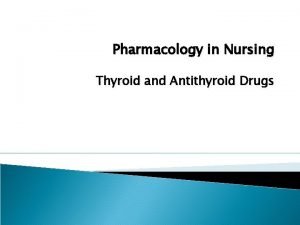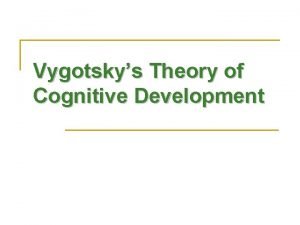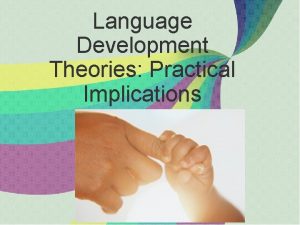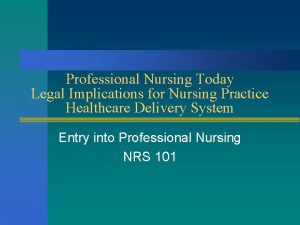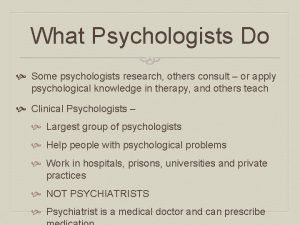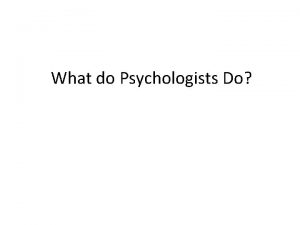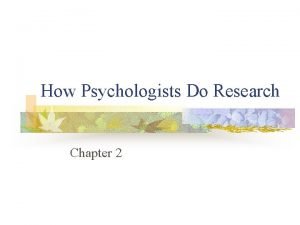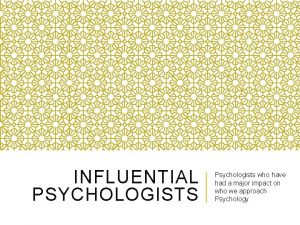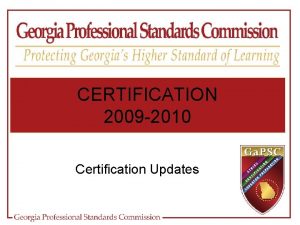Certification of Psychologists in Europe Implications for Teaching















- Slides: 15

Certification of Psychologists in Europe: Implications for Teaching Psychology Ype H. Poortinga (Em Prof) Tilburg University, Netherlands & Catholic University of Leuven, Belgium

A bit of history In the EU mobility of workers was a right since 1957, but there was lack of recognition of national qualifications across member states The Directive 89/48 EEC, which covered psychologists, required recognition of three years of academic level training unless there was national regulation of a profession in a state In 1999 the Bologna Agreement aimed at a common structure for all university curricula: 3 years Bachelors + 2 years Masters (or 1 year) Since about 2000 a new regulation was under discussion resulting in the Directive 2005/36 EC on the recognition of professional qualifications, which leaves some space for professions to define their own regulations at the EU level (psychologists took part in the discussion with the EU)

A bit more history The European Federation of Psychologists Associations (EFPA) was formed in 1981 to bring together national psychological associations, partly in reaction to the growing integration of the EU In 1990 EFPA unanimously approved a set of Optimal Standards for the Professional Training in Psychology, including: - Common core curriculum for all fields of psychology - Advanced component for the chosen field of practice - Inclusion of professional training - Combined duration at least 6 years The Optimal Standards served as an informal standard for the level of education and professional training desired for a psychologist

Towards a European certificate for psychologists In 1999 Ingrid Lunt, then President of EFPA, brought together a project team of 15 individuals from 12 countries with funding from the Leonardo da Vinci program of the EU The aim was to develop standards of professional practice and education and training for psychologists A report was published: Euro. Psy. T: A framework for education and training for Psychologists in Europe (2001) A slightly expanded team was responsible for a second report: Euro. Psy - the European Certificate in Psychology (2005) The standards were ratified by EFPA (2001 and 2005) and submitted to the EU, in the context of recognition of professional qualifications (Directive 2005/36/EC) In 2005 a pilot certification project was started in six countries (Finland, Germany, Hungary, Italy, Spain, UK) Soon the Euro. Psy certificate for independent practice can be expected to set a benchmark of quality for psychologists' services across Europe

Key points of the Euro. Psy Certificate Entry in the Register of Euro. Psychologists requires: - A five-year curriculum in psychology (300 ECTS) at an accredited university - One year of supervised training, - Endorsement of the professional code of ethics in the country of practice as well as the EFPA meta-code The validity Euro. Psy will be 7 years; renewal will require: - Evidence of sufficient work experience during the past period - Evidence of Continuing Professional Development (CPD) The certificate is meant to be a basic diploma for independent practice at a basic level The validity is limited to the field of practice and training Specialist interventions require further training

Organization of Euro. Psy There will be a European Awarding Committee appointed by EFPA providing guidance to the National Awarding Committee in each country appointed by the EFPA member association Accreditation of universities and accreditation of supervisors for the supervised training period rests with each national committee The European committee can suspend the delegated authority of a national committee

Some issues and controversies Input or output assessment of knowledge and skills? “Input” (what is taught) for university studies and CPD “Output” (what is learned) for the supervised practice year; assessment by accredited supervisors Limitations on areas of practice? Registration is in one (sometimes two) professional areas; clinical and health, education, work and organizations, or “other” Life-long or limited validity of the certificate? Entry in the Euro. Psy Register is for seven years (as mentioned) Use of the Register for marketing purposes? Some professionally relevant information can be added to an entry

Possible threats / disadvantages Could a European benchmark lower quality in countries with high standards? Surveys showed most variance not in academic curriculum but in specialist training; the six years of the Optimal Standards of 1990 reflected broad consensus among psychologists, although several countries fell short of this Is it optimal to have a single set of standards for all fields of practice? Euro. Psy addresses common competencies (see below), e. g. , all interventions require integration of information from multiple sources and weighing possible courses of action Do European standards detract from national traditions? These traditions were found to be mainly historical; individual and departmental variations in the science and profession of psychology tend to be larger than national variations

Educ and training, Bachelors (* = knowledge; ** = skills Three perspectives: individual, group, systems/society Most emphasis on individual and theories + skills (130 ECTS) Content to be covered: * Orientation (methods, history, areas) * Explanatory theories * Technological theories (e. g. , data theory) ** Explanatory theories (e. g. , assessment skills training) ** Technological theories (e. g. , test construction training) * Methodology, (at least 30 ECTS for this + the next category) ** Methodology (e. g. , experimental practice) ** Academic skills * Non-psychology theories

Education and training, Masters Curriculum can be either undifferentiated (e. g. , research oriented) or preparing for practice in a professional area Emphasis on theoretical courses, assignments, etc. (60 ECTS) Content to be covered: * Orientation, area oriented * Explanatory theories (general + area oriented) * Technological theories (general + area oriented) ** Explanatory theories (general + area oriented) ** Technological theories (general + area oriented) * Methodology ** Academic and general professional skills * Non-psychology theories Basic competence, research (15 -30 ECTS) Basic competence, internship (stage) (at least 30 ECTS)

Supervised practice (one year) and beyond Semi-independent work in a (‘certified’) professional setting Assessment profile based on competences Supervisors need to qualify as such and need to be experienced practitioner With renewal is required of: Evidence of continued work experience (400 + hours/year for 4 out of last 6 years) CPD (40 hours/year; 80 + hours/year recommended) CPD evidence entails: certified attendance of courses, authorship and editing, presentations to professionals, etc.

Primary competences (n = 20, in 6 categories) Goal specification: needs analysis, goal setting Assessment: individual, group, organizational, situational Development: services or products definition + design + testing + evaluation Intervention: planning, person oriented, situation-oriented, indirect, service or product implementation Evaluation: planning, measurement, analysis Communication: giving feedback, report writing

Enabling competencies (n = 8) Professional strategy (choosing appropriate strategies for problems) CPD Professional relations Research and development (new products) Marketing and sales (bringing products to clients’ attention) Account management (maintaining relationships with clients) Practice management (e. g. , financial, operational) Quality assurance (establishing a quality maintenance system) Self reflection (on practice and competence)

Conclusions Euro. Psy, a certificate for independent practice as a psychologist in European countries most likely will be a reality in a few years (cf presentation of Remo Job on Italy) The main goal of the Euro. Psy project has been to enhance the quality of psychologists' services, (what the EU likes to see is better mobility of professionals) Euro. Psy registration requires a combination of scientific and professional competences based on both knowledge and skills An ethical orientation and CPD are encouraged There are prescriptions on numbers of ECTS to be minimally spent on theoretical and professional issues, but not on the contents of teaching

Discussion points? Is Euro. Psy constraining future development of curricula (and teaching methods)? Is Euro. Psy constraining variation in approaches to psychology as a science and a profession? Does Euro. Psy offer sufficient guarantees for quality in education and training? Does Euro. Psy strike the right balance between - public interests + the interests of the profession - freedom and responsibility of the individual psychologist? Is Euro. Psy too much oriented to psychology as a profession; or perhaps too much to psychology as a science?
 Alternative certification oklahoma
Alternative certification oklahoma Lonestar send transcript
Lonestar send transcript Moecs michigan
Moecs michigan Alternative teaching certification alabama
Alternative teaching certification alabama Definitions of microteaching
Definitions of microteaching 3002001030
3002001030 Nursing implications
Nursing implications Future implications definition
Future implications definition Novolin n dosage chart
Novolin n dosage chart Nursing implications for synthroid
Nursing implications for synthroid Implications of vygotsky's sociocultural theory
Implications of vygotsky's sociocultural theory Implications of nativist theory
Implications of nativist theory Tautological implications
Tautological implications Trends and issues in nursing
Trends and issues in nursing Social implications of computers
Social implications of computers Database approach
Database approach





